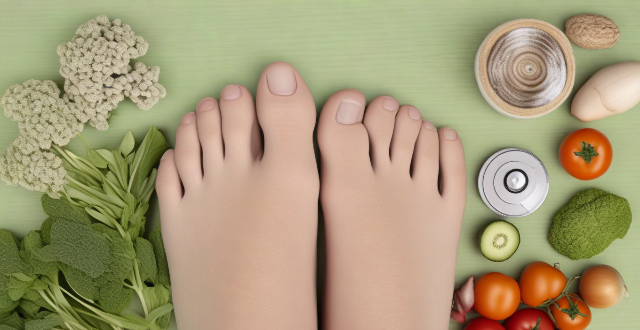The text discusses the various consequences of neglecting foot hygiene, including physical health risks such as athlete's foot, toenail fungus, ingrown toenails, blisters and calluses, plantar warts, smelly feet (bromodosis), corns, bunions, gout, cellulitis, diabetic foot ulcers, deep vein thrombosis (DVT), and peripheral neuropathy. It also addresses mental health impacts like embarrassment and self-consciousness, anxiety, and stress. The text provides detailed descriptions and prevention tips for each issue, emphasizing the importance of good foot care habits to maintain overall foot health.

Consequences of Neglecting Foot Hygiene
Neglecting foot hygiene can have several negative consequences on both your physical and mental health. Here are some of the potential issues you may face:
Physical Health Risks
Athlete's Foot
- Description: A fungal infection that causes itchy, cracking, and peeling skin.
- Prevention: Keep feet dry and clean, wear breathable shoes and socks, and avoid walking barefoot in public areas.
Toenail Fungus
- Description: A fungal infection that causes thickened, discolored, and brittle toenails.
- Prevention: Trim toenails straight across, wear well-fitted shoes, and avoid sharing personal items like nail clippers.
Ingrown Toenails
- Description: When the edge of a toenail grows into the skin, causing pain and swelling.
- Prevention: Cut toenails straight across, wear comfortable shoes, and trim toenails regularly.
Blisters and Calluses
- Description: Blisters are small fluid-filled bumps caused by friction or burns, while calluses are hardened layers of skin formed as a protective measure against repeated pressure or friction.
- Prevention: Wear properly fitted shoes, use moleskin or bandages to reduce friction, and moisturize feet regularly.
Plantar Warts
- Description: Small, hard growths on the soles of the feet caused by a virus.
- Prevention: Avoid direct contact with infected surfaces, wear shower shoes in public areas, and keep feet clean and dry.
Smelly Feet (Bromodosis)
- Description: An unpleasant smell caused by bacteria thriving in sweaty environments.
- Prevention: Wash feet daily, dry thoroughly between toes, wear breathable shoes and socks, and use antiperspirant foot powders or sprays.
Corns
- Description: Hardened layers of skin that form on top of or between toes due to pressure or friction.
- Prevention: Wear comfortable shoes, use corn pads to relieve pressure, and see a podiatrist for professional treatment if necessary.
Bunions
- Description: A bony bump at the base of the big toe joint caused by inflammation and bone remodeling.
- Prevention: Wear wide, comfortable shoes, avoid high heels, and consult a podiatrist for appropriate footwear recommendations.
Gout
- Description: A form of arthritis caused by high levels of uric acid in the bloodstream, often manifesting as sudden, severe pain in the big toe joint.
- Prevention: Maintain a healthy weight, eat a balanced diet low in purines, stay hydrated, and avoid excessive alcohol consumption.
Cellulitis
- Description: A bacterial skin infection that can occur when cuts or breaks in the skin are not properly cleaned and cared for.
- Prevention: Wash any open wounds immediately, keep them covered, and seek medical attention if signs of infection appear.
Diabetic Foot Ulcers
- Description: Slow-healing sores that can lead to serious complications if left untreated.
- Prevention: Monitor blood sugar levels, inspect feet daily for any changes or injuries, wear proper footwear, and seek prompt medical attention for any concerns.
Deep Vein Thrombosis (DVT)
- Description: Blood clots that form in the deep veins of the legs, which can be life-threatening if they break loose and travel to the lungs.
- Prevention: Move your legs during long periods of sitting, wear compression stockings if recommended by your doctor, and maintain an active lifestyle.
Peripheral Neuropathy
- Description: Nerve damage in the feet caused by various factors including diabetes, alcohol abuse, and certain medications.
- Prevention: Control underlying conditions such as diabetes, avoid excessive alcohol consumption, and discuss potential side effects with your healthcare provider before starting new medications.
Mental Health Impacts
Embarrassment and Self-Consciousness
- Description: Feeling self-conscious about the appearance or odor of your feet can lead to reduced self-esteem and social isolation.
- Mitigation: Practice good foot hygiene habits, seek professional help for ongoing issues, and remember that foot problems are common and treatable.
Anxiety and Stress
- Description: Worrying about potential complications from neglected foot care can cause unnecessary stress and anxiety.
- Management: Educate yourself on proper foot care techniques, consult with a healthcare professional if needed, and focus on positive self-talk to alleviate concerns.
By prioritizing foot hygiene and addressing any issues promptly, you can significantly reduce the risk of these consequences and maintain overall foot health.